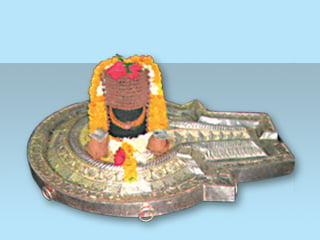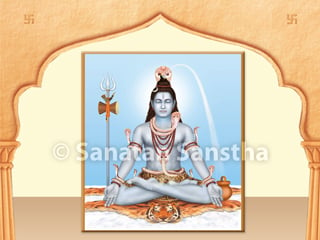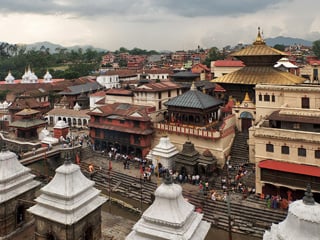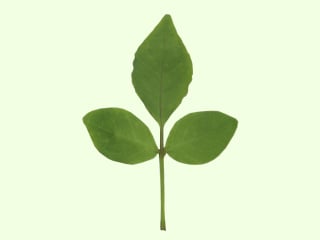Special features of ritualistic worship of Shiva and the underlying spiritual science
1. ‘In the ritualistic worship of Shiva, the conch is not worshipped nor is its water used to bathe Shiva. If a bāṇalinga is a part of the Panchāyatan of Deities, then we may sprinkle water from the conch on the bāṇalinga. However, a bāṇalinga with a Shivapinḍī should not be bathed with this water.
Spiritual science : Since the feminine Principle in the form of the shālunkā is in the pinḍī, there is no need to sprinkle water from the conch, which also has a feminine Principle.Abāṇalinga, however, does not possess a shālunkā; hence, it is bathed with water from a conch.
2. During ritualistic worship of Shiva in a temple, the conch is not worshipped. Blowing of the conch before the Āratī is prescribed and is necessarily done during the Āratī.’
Spiritual science : The sound of a conch not only confrms to the study of Prāṇāyām, but also alleviates distress caused by spirits, black magic etc. in the vicinity where it can be heard.
3. ‘Tulsī (Holy basil) leaves are not offered to Shiva. However, tulsī leaves offered to a shāligrām or an Idol of Shrīvishnu frst, may be offered to Shiva.’
Spiritual science : Shiva considers Shrīvishnu His Guru. He is a devotee of Shrīvishnu. So He loves the tulsī leaves offered to Shrīvishnu.
4. ‘The bēl leaves, white flowers and Naivēdya (Food offered to the Deity as part of ritualistic worship) offered to the Shivapinḍī are not partaken.’
Spiritual science : Shiva is the Deity of detachment. If an ordinary individual consumes the offerings made to Shiva, they can induce detachment in him, which he normally may not want; hence it is said that the offerings made to the Shivapinḍī are not partaken.
Regular acts involved in the worship of Shiva
Each Deity has its own distinct science of worship. This means that there is spiritual science underlying every act that is performed in a particular manner for worshipping the Deity. Such acts allow the worshipper to get more beneft of the Deity Principle. The table ahead provides knowledge received by seekers of Sanatan by God’s grace on how exactly some acts should be performed in the worship of Deity Shiva.
| Act in worship | Divine knowledge received about the act due to God’s grace |
| 1. Offering of flowers to Shiva
A. Which flowers ? B. In what numbers ? C. Method of offering flowers D. In what shape should the flowers be offered ? |
Nishigandhā, jāi, jūi and mogarā Ten or in multiples of ten The stalk should be towards Shiva In a circular manner and the void thus created in the centre should also be flled with flowers |
| 2. Waving of incense-sticks
A. Fragrance of incense-stick for tārak worship B. Fragrance of incense-stick for mārak worship C. In what numbers ? D. Method of waving incense sticks |
Chamēlī and heenā Kēwaḍā (Note 1), heenā and darbār Two Incense-stick should be held between the forefnger and thumb of the right hand and should be waved three times in a clockwise direction |
| 3. Which fragrance should be offered ? | Kēwaḍā |
What is the right way to do the Pradakshina of Shiva ?
Circumambulation (Pradakshina) of Shiva is like the crescent, that is, somasūtri. The channel which runs northwards towards the som (Moon) from the shālunkā till the boundary of the temple is known as the somasūtra. We should begin circumambulating from the left side and continue till the channel of the shālunkā from where the water offered during the Abhishēk flows. Without crossing it, we should complete a circumambulation, by moving in the reverse direction up to the other side of the channel (also known as the stotra). This rule applies only if the Shivalinga has ben installed or created by man; it does not apply to a swayambhū or a chalalinga (placed in the house). The flow of a shālunkā is not crossed, since it is the flow of Shakti. When we cross it, the legs are spread. As a result, formation of semen and the five vāyus (Internal vital energies) are adversely affected. Flow of dēvdatta and dhananjaya vital energies is obstructed too. However, it does not have any effect if while crossing it the body is contracted, that is, the nāḍīs (Channels) are contracted. Rationalists feel that the channel of the linga is not crossed, because while doing so the dirt on our feet contaminates the water there. If devotees consume this water as Tīrtha (Sacred liquid), it could result in illness.

 12 Jyotirlinga
12 Jyotirlinga Sattvik picture and Name-strip of Deity Shiva
Sattvik picture and Name-strip of Deity Shiva Bhasma
Bhasma What is the concept of Final Liberation as per the Pashupat sect?
What is the concept of Final Liberation as per the Pashupat sect? Why are trifoliate bel leaves offered to Lord Shiva ?
Why are trifoliate bel leaves offered to Lord Shiva ?